So glad we got your attention. Puppy mills or farms are notoriously inhumane and continue to break the few and insufficiently cruel guidelines that the AWA (Animal Welfare Act) or the USDA sets out.
Puppy mills have an interesting business model. Basically, their slogan says, “Abused, Neglected, Unhealthy Puppies For Sale.” Yet, people continue to support them unknowingly and perhaps out of compassion for the animals they abuse.
Puppy mills are bad because they mistreat animals in every way possible, and the Humane Society and other animal advocates are trying desperately to take them down.
But sadly, there are only a few laws in place, and they have little effect. Commercial breeders or puppy mills sell over one million puppies through a broker network to pet stores: mainly Petland.
So now that you’ve had an introduction to puppy mill cruelty, and if you have the stomach for it, there are dozens of reasons we must stop puppy mills. Period.
Puppy Mills
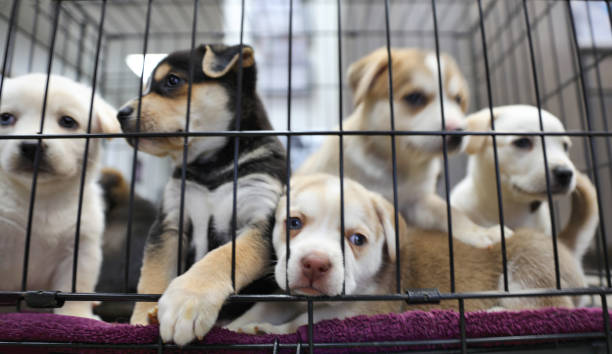
Perhaps the image of puppy mills for many people means visualizing an assembly line and neatly prepared packages of puppy cuteness rolling off the conveyor belt into the extended arms of a new puppy’s parents. It isn’t so!
Puppy mills or commercial breeders provide only the bare necessities, which is debatable. Mother dogs and their puppies live in appalling living conditions with health issues and a poor quality of life.
This is the type of treatment puppy mill commercial breeders subject their animals to daily:
- None or very little veterinary care to treat diseases like canine Brucella–brucellosis, parvo, worms, fleas, genetic illnesses, and general stress and anxiety.
- No preventative veterinary care.
- Breeding female dogs spend their entire lives in small cages.
- Filthy, unsanitary conditions are prevalent in most puppy mills.
- Inhumane suffering develops into behavioral issues & builds aggression.
- Overcrowded commercial breeding facilities have deafening noise levels.
- No grooming or handling until they’re shipped and sold.
Puppy Mill Statistics
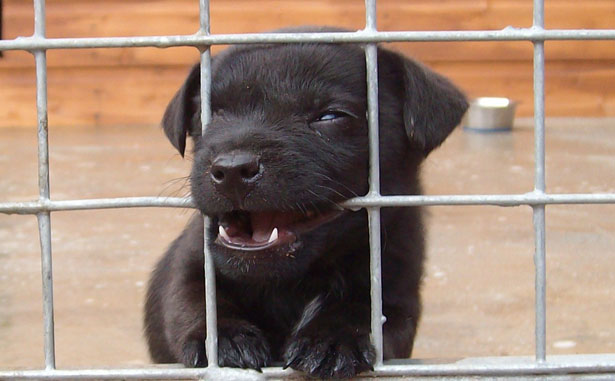
At WAF, we’ve already amassed a ton of research behind puppy mill statistics. We don’t fictionalize these facts but use trusted resources from animal groups like the Humane Society and PETA that help shine the spotlight on these commercial breeding kennels.
Although licensed commercial breeders (only 3000) fall under the USDA’s jurisdiction, no fines or action prevent puppy mills from doing business. Not to mention the 70000 unregistered breeders that suffer no consequences or fines for their acts of animal cruelty.
Top line facts about puppy mills:
- Ten thousand commercial breeding facilities and only 3000 regulated (not that regulations affect how poorly animals are treated).
- Half a million females are kept for breeding stock only.
- Sell over 2.6 million puppies to unsuspecting pet parents.
- Sixteen states have no laws to protect dogs and cats from puppy mill owners.
- Only 24% of puppy mills are licensed and are poorly regulated.
- No dogs or puppies in puppy mills experience any human kindness.
- 41.6% of puppy mill dogs will experience health problems (more so than the regular dog population).
- HSUS has compiled a Horrible Hundred List. (Did you know Amish communities run 20% of the nation’s puppy mills?)
- Few violaters or repeat violators suffer fair consequences even when they break the law.
- Spread diseases like Campylobacter jejuni.
- Sold through a broker network and inhumanely transported without food, water, or bathroom breaks.
We know the facts are shocking, and they are not an exaggeration. If you’re still wondering, “are puppy mills illegal?” we have more info to share. One of the big concerns animal and dog lovers have is how we can turn our backs on these puppies when we come face to face with them.
It’s perhaps the most difficult advice the HSUS and WAF can hand out.
Please walk away from purchasing a pet store pet. Consider adopting from animal welfare shelters like your local ASPCA. Saving that puppy only prolongs the agony of millions more as inhumane dog breeding continues.
Why Are Puppy Mills Bad
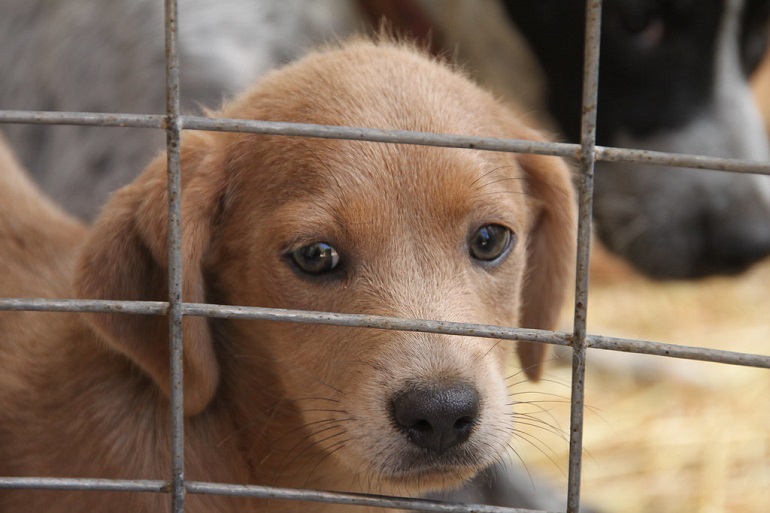
Well, we dare you to study the photographs we include in our research. If you can look at them, your heart must surely be breaking (mine is permanently dented). Puppy mills, like animal testing, are a breathtakingly cruel reality for animals.
Inside Puppy Mills
The deafening noise of dogs barking in distress is the first thing that hits you. Before you can even recover your senses, the stench will get to you. If you have the guts, watch this HSUS video; it’s not long but will crush you!
When you step inside a puppy mill, you’ll wonder how we can blindly continue our day. Once you look at the product they produce, those broken bodies kept in small cages, often with wire flooring stacked on top of each other, you’ll feel your knees buckle.
It won’t take a rocket scientist to determine that these puppy mill dogs don’t get regular veterinary care. No self-respecting vet would visit, though having said that, a self-respecting vet would do anything to help these animals in distress.
Health Concerns
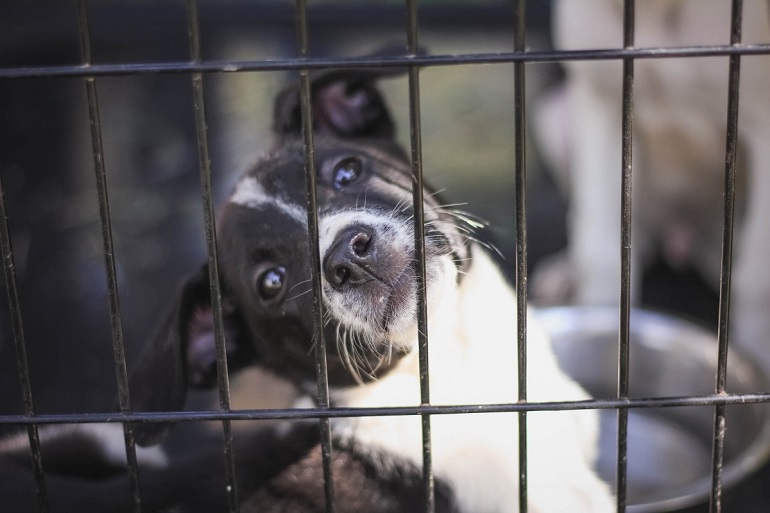
Puppy mills are notorious for outbreaks and transmitting diseases like brucellosis and campylobacter jejuni. Since getting real figures of how many puppies and breeding females die (these unscrupulous breeders are not eager to share info), we can only speculate that thousands of these animals suffer horrendously.
- Assume they get no regular veterinary care
- No updated vaccines
- No flea or worm treatments until they’re primped for shipping
- Live in small cages in their own poop and pee
- Limited access to clean water, poor food
- Overbreeding and inbreeding and killed when no longer productive
- No human kindness or any socialization
- Breed genetic flaws and many common dog illnesses without concern
Fact: Dogs experience emotional trauma, and puppy mill facilities perpetuate that problem.
Anxiety and Socialization Issues
One of the first lessons new pet parents learn is the importance of socializing our dogs, which makes sense since a dog is a pack animal. Inside a puppy mill, puppies might get crammed into a pen with their siblings.
However, the entire experience for these puppies is based on anxiety and stress. Many puppy mill puppies are also taken from their mothers very young.
Puppies deserve to know their mom for at least eight weeks, and reputable breeders and veterinary colleagues agree that anything under is not advisable.

Overbreeding and Inbreeding
Reputable dog breeders understand the importance of breeding the best qualities, temperament, and health into their puppies to promote longevity.
Inside puppy mills, females are bred as often as their cycle allows leading to overbreeding.
Breeding bitches, (by the way, bitches is not a negative word when used correctly) also require better quality food and veterinary care, which they are apt not to receive in these facilities. Breeds like Bulldogs also have unique medical needs when giving birth.
Reputable breeders don’t inbreed for obvious reasons, while puppy mills utilize whatever stock they have to pump out as many sellable puppies as possible. These breeders don’t care about the quality of the health of the puppies or you–the new pet parent.
What Do Puppy Mills Do With Unsold Puppies?
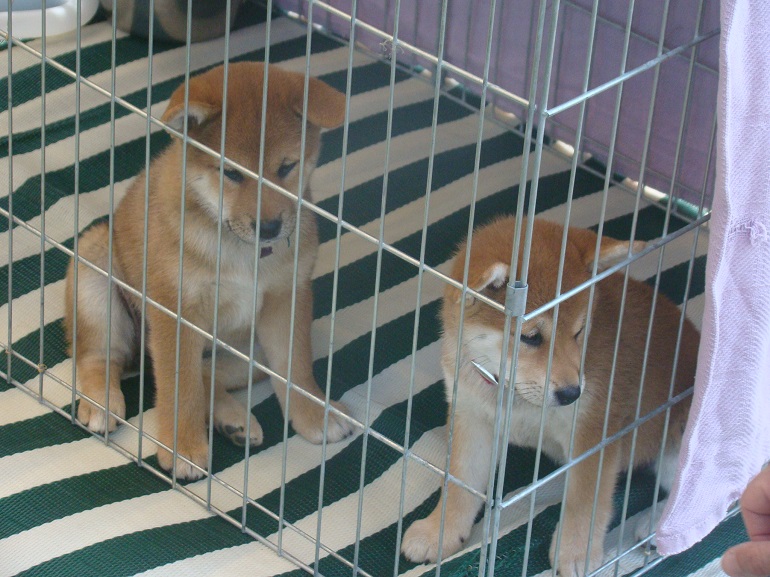
Let’s make it nice and cozy for you. Pet parents who have lost a pet to illness or old age know their pet ends up at the Rainbow Bridge. It’s a happy place where dogs roam and enjoy the life they deserve–it’s purely fictional but helps those who need comfort in times of grief. Unsold puppies end up there too.
They’re killed, often inhumanely. If these puppies are already inside pet stores, they will get a price reduction until some poor person falls for the ploy, and who wouldn’t? Sometimes a staff member might take pity on the puppy and take it home. However, this practice keeps puppy mills in operation since they have already got paid.
Fact: As a pet parent, it’s difficult to overcome the loss of a pet. Not everyone understands our intense emotional bond with our companions. The Rainbow Bridge helps!
Puppy Mill Conditions
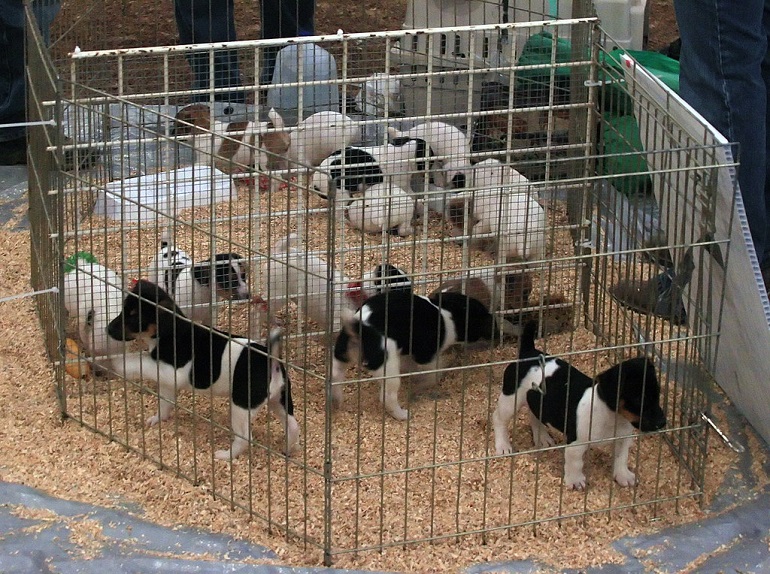
Numerous words describe puppy mill conditions, but horrendous is as good as any. For those who want to get emotional, heartwrenching is another!
Commercial breeding evolved into its current state because there is a huge demand for pet dogs and cats. The pandemic drove numbers to new highs, but the pet care industry has grown since 1988.
Puppy mills can’t churn out good-quality purebreds and in-demand designer mixes fast enough. There is never enough staff to care for these dogs in filthy small cages.
Most dogs never get a chance to interact with kindness or other dogs. They’re forced to relieve themselves inside their pens (why many unscrupulous breeders use wire flooring).
Puppy mills also provide inadequate food and sanitation and little in the way of vet care. There is continuous barking, whimpering, and the sound of animals suffering in agony.
Breeder Vs. Puppy Mill
Reputable breeders want to promote the breed under their care. They breed champion class dogs and believe that the breed they represent is the best of the best. Breeders spend large amounts of money on veterinary care and proper dog nutrition and have a limited supply.
Professional breeders interview prospective pet parents and provide a contract. They like to stay in touch and want a progress update. They like nothing better than to hear how their puppy is faring under your care. It’s a lifelong relationship and resource for new parents. New litters are part of the family, and visitors are encouraged.
Puppy mills sell their product through brokers and in auctions. Few people make it inside a puppy mill unless they mistakenly take a job there or work for the USDA or animal welfare group. There are no open invitations. Commercial breeders overbreed and inbreed without concern for their dogs’ welfare or living conditions.
Many puppy mill breeders have stacks and rows of pens in sheds, and dogs endure all kinds of weather conditions. Food is usually second-rate. It’s another reason why you should know the difference between a puppy mill vs. a breeder.
What Are Backyard Breeders
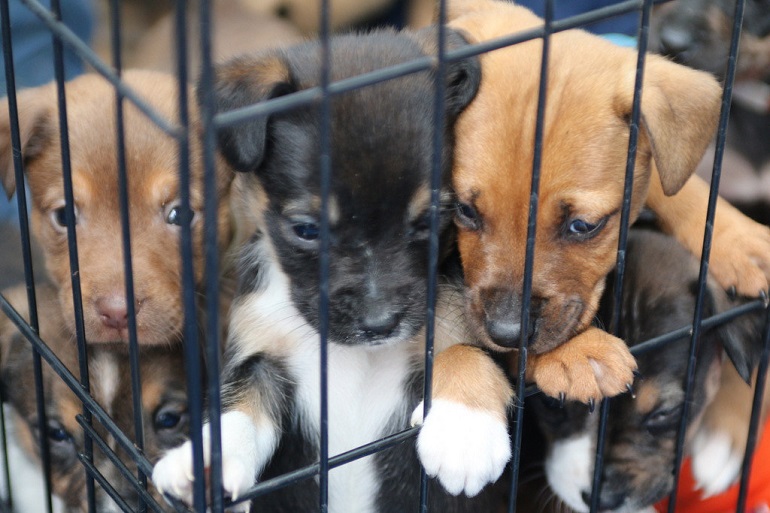
Backyard breeders or grey-zone market breeders are often irresponsible individuals who either neglect to have their animals spayed and neutered or breed a handful of dogs for extra money.
Backyard breeders are small-scale puppy mills with little consequence for the development of the breed. They typically sell their dogs through classified ads or at the local market out of the back of a vehicle.
Backyard breeders like puppy mills provide inadequate care and spread illnesses (kennel cough, parvovirus, and parasites like fleas and worms), creating behavioral issues. Backyard breeding contributes to animal overpopulation of cats and dogs.
Instead of buying from a backyard breeder or puppy mill, please consider adopting from a shelter.
Are Puppy Mills Illegal
Puppy mills are only illegal in several states. California, Maine, Maryland, Washington, Illinois, and New York. Pennsylvania and many cities and towns (350+) forbid pet stores from selling dogs and cats.
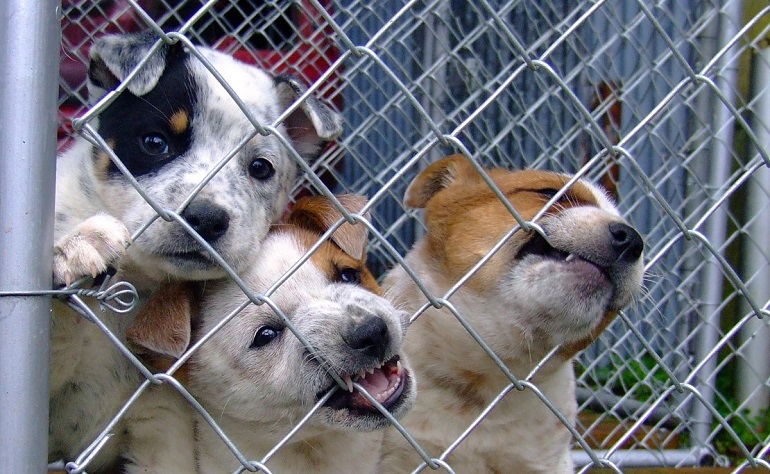
Yes, it’s 2023, and sixteen states have ZERO laws to protect pets in puppy mill facilities. ZERO. Worse, the organizations like the AWA and USDA that are intended to protect animals have little say or enough staff to enforce the vague laws that exist. (Yes, I am yelling!)
Further, numerous lobbyists prevent laws from passing to protect massive factory farms. (Still yelling!)
How to Avoid Puppy Mills
It’s one of the hardest things you’ll ever do. But when you turn your back on some adorable pup for sale in your local (mega) pet store, you’re helping end the vicious cycle of puppy mill breeders.
Yes, there is a very sad side to not buying that puppy. However, a dog or cat is waiting for you, with those same soul-searching eyes, at the local shelter.
If you have your heart set on a specific breed you believe is a perfect match for your family, research. At WAF, we are trying hard to provide you with research tools and facts.
Next time you go to your local market and see the truck with the tailgate down selling puppies, please walk the other way. Puppies are not impulse buys or Christmas presents.
How You Can Help
Thanks for asking. You are the missing link and make a tremendous impact with your choices. One of the best things you can do is not buy from a pet store, which means you do not indirectly support puppy mills or brokers. Thanks for walking away!
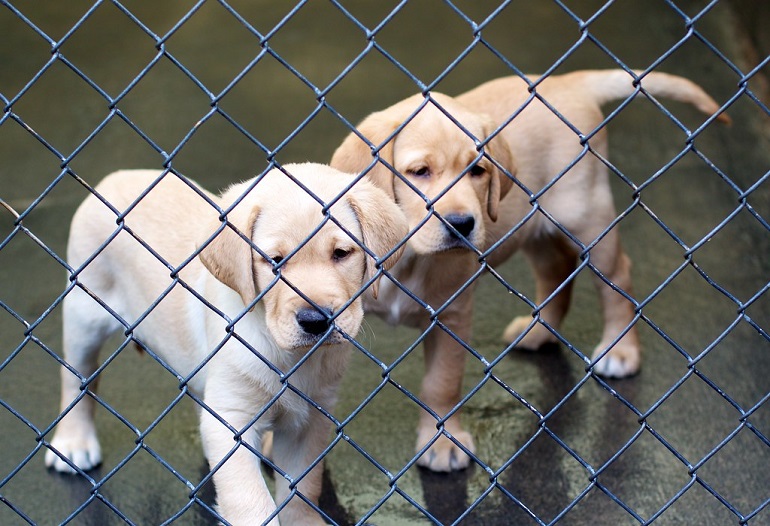
You can also help to educate others by sharing our data about animal stats. It would also be tremendous if you could sign petitions and volunteer for organizations like HSUS, RSPCA, or any animal welfare shelter. Sometimes a monetary donation is awesome too.
Find out more about HSUS Stopping Puppy Mills.
FAQ’s
We hope you’re finding this information helpful and also hope it gets you right in the heart. These animals bred for profit need your help. Do not buy from pet stores, as they will sell you a puppy mill dog without you knowing. (Glad that we made you aware so that you can help rescue groups and the Humane Society instead.)
What Do Puppy Mills Look Like?
Few of us will ever stumble across a puppy mill. They’re hidden away in the countryside or industrial or commercial areas. They’re typically poorly maintained, and dogs are penned in very small kennels or cages, often with wire flooring, which is inhumane.
Many puppy mills are outside, so dogs have to live in all types of weather. It’s not Knott’s Berry Farm.
Which Dog Breeders Should Be Avoided?
Commercial, backyard, and grey-zone breeders should be avoided because they don’t care about the breed. They care about greed. And no–we are not sponsored by any organization or lobbyist group. But we need your support to stop puppy mills.
Backyard breeders, puppy mills, and pet stores don’t deserve your money. They harm millions of dogs and responsible breeders who uphold federal law.
How Much Does It Cost to Buy a Puppy From a Puppy Mill?
The prices of puppies from puppy mill breeders and reputable breeders can fluctuate depending on the breed, its popularity or rarity, and the breeder.
Puppy mills can sell for cheaper, and their dogs are often sold through auctions since they receive minimum vet care, which costs real responsible breeders a substantial sum. However, still expect a puppy mill product to sell for less.
A particular prominent pet store has a $ 600 dollar-off coupon like puppies belong in a sale bin.
Conclusion
We hope this information has helped clarify why puppy mills are bad for puppies, you, the breeding parents, and the countless shelter animals. We get that puppies, regardless of where they come from, are cute and deserve kindness and love.
However, to end this vicious cycle, we must continue supporting organizations that work relentlessly to create laws protecting animals and putting puppy mill breeders out of business.
Thanks for listening and being concerned. And did we mention that animal shelters are a better solution than pet stores?


